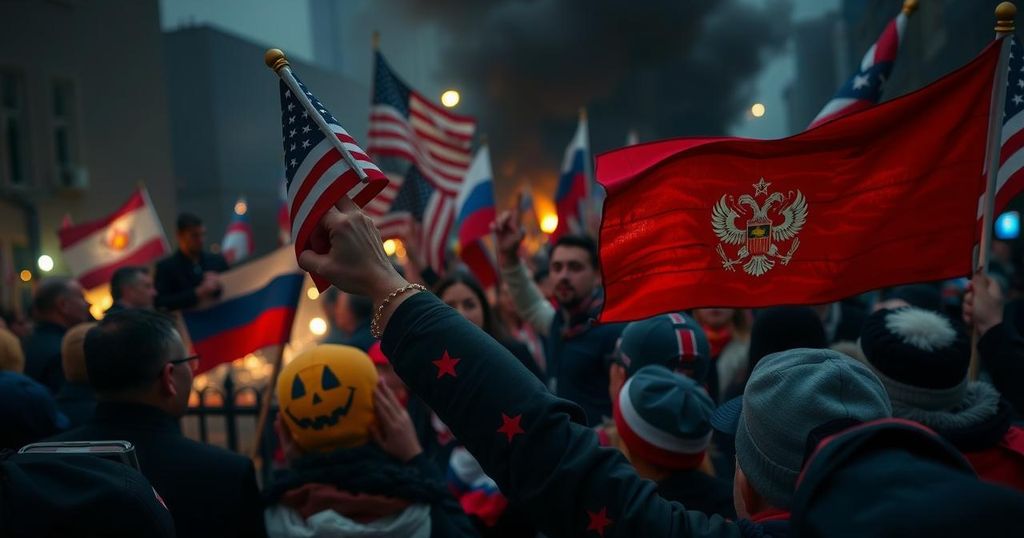Intelligence officials have alerted the public to the possibility of Russia and Iran inciting violent protests in the United States following the upcoming election. A recent declassified memo reveals efforts by these nations to sow discord and complicate the electoral process, potentially through covert organization of protests and disinformation tactics aimed at undermining public trust in the election results. The memo cites past instances of foreign attempts to manipulate American socio-political dynamics and raised concerns about the potential for violence, particularly in the wake of heightened political polarization.
Intelligence officials have expressed concerns regarding the potential for Russia and Iran to instigate violent protests in the United States following the upcoming election. A declassified memo from the Office of the Director of National Intelligence highlights recent attempts by both nations to destabilize political discourse ahead of the vote. These adversaries may either covertly orchestrate protests or endorse actions led by domestic groups to exacerbate division, cast doubt on election results, and complicate the presidential transition process. One incident cited involves Russian military intelligence attempting to recruit an American for protest organization, who was reportedly unaware that he was engaging with Russian agents. Furthermore, Iranian elements have been implicated in funding protests connected to anti-American sentiments, with supporting evidence of financial contributions for event travel. The intelligence community has raised alarms about the heightened risk of politically motivated violence this electoral cycle, especially given the increased understanding that foreign adversaries have about the U.S. electoral certification process. The events of January 6, 2021, exemplifying how misinformation can incite violence, add to these concerns. The interim between Election Day and presidential inauguration is particularly susceptible to interference, as foreign adversaries and domestic extremists may exploit any perceived irregularities to incite chaos. As a precaution, election officials are implementing safety measures, including enhanced security features across polling sites. The ongoing climate of political polarization and mistrust has been exacerbated by Russia, Iran, and China through disinformation campaigns aimed at deepening divisions within American society. Each nation has its strategic interests, with Russia appearing to support candidates favorable to its agenda regarding Ukraine, while Iran has indirectly targeted U.S. electoral processes out of retaliation for past actions by the Trump administration. Despite these serious allegations, the aforementioned countries have publicly denied any intentions to interfere with the U.S. electoral process, citing previous statements refuting such claims. Moreover, the possibility of foreign entities employing violence as a method to intimidate voters is a pressing concern, echoing occurrences from the 2020 election cycle, where disinformation tactics were reportedly used to suppress voter turnout. In response to these threats, civil rights organizations are proactively combatting misinformation and fostering resilience among voters through public campaigns to ensure electoral participation remains robust and uninfluenced by malefactors. Maya Wiley, president of the Leadership Conference for Civil and Human Rights, emphasized the agency of voters, asserting that “in 2024, voters must know that they will decide the outcome of the election — not a political party, extremist groups or purveyors of disinformation.” Intelligence analysts remain vigilant as the election draws nearer, underscoring the crucial role of maintaining democratic integrity and electoral confidence against external and internal challenges.
The prospect of foreign interference in U.S. elections has been a recurrent theme in contemporary geopolitical discourse, particularly accentuated by previous instances of alleged meddling. Intelligence officials from the United States have issued warnings regarding potential attempts by nations such as Russia and Iran to instigate political unrest and amplify divisions within the U.S. political landscape, particularly surrounding electoral events. Historical events, including the attack on the Capitol on January 6, 2021, act as a sobering reminder of the potential for misinformation to incite real-world violence. Moreover, geopolitical relationships and past U.S. foreign policy actions, particularly towards Iran and Russia, inform the motivations behind their current strategies in attempting to destabilize American democratic processes.
In conclusion, the warnings issued by intelligence officials regarding the involvement of Russia and Iran in promoting potential post-election violence underscore a significant concern for the integrity of the electoral process in the United States. With past instances of disinformation tactics contributing to political unrest, the current climate of distrust and polarization poses unique challenges for maintaining democratic governance. Proactive measures by civil rights organizations highlight a collective effort to counteract these foreign influences and encourage a more resilient electorate, especially as the critical period surrounding the election approaches.
Original Source: apnews.com






